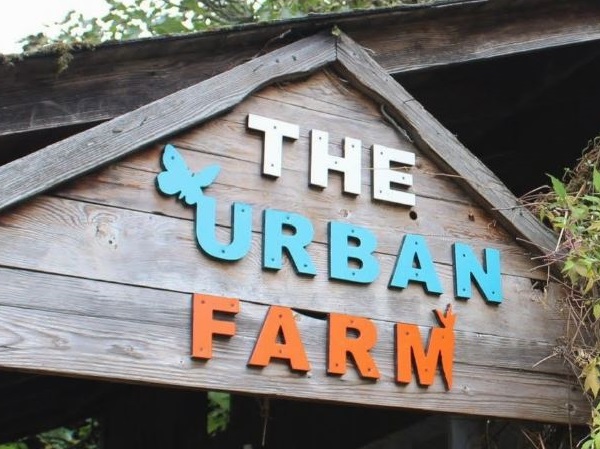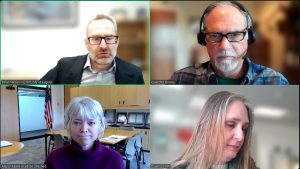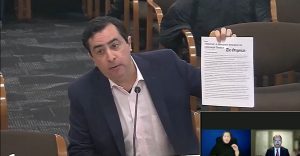Save the Urban Farm and the marbled murrelet
7 min read
Public comment on the urban farm, methane and much more at the Eugene City council Nov. 28.
[00:00:06] David Piccioni: I wanted to say that one of the souls of Cascadia, the marbled murrelet, has to be defended because there’s only a few of those birds left… so I think we should really make an effort really forcibly to protect the marbled murrelet. Thank you very much.
[00:00:26] Mark Ringsdorf: Mark Ringsdorf. I live in Ward seven, I’ve lived here for many decades, old-time Eugene guy. I’d like to look at the big picture tonight. What you call electrification is banning fossil fuel, specifically natural gas. … It’s very clear that you are moving towards a total ban. You’re talking about the cost to do so. You’re talking in your meeting tonight about setting things up. You are hiding this— your end result here—just to get the first step. You’re getting your foot in the door. You’re playing the people who you represent as fools.
[00:00:58] You cannot supply the power through EWEB. EWEB doesn’t have the power and all additional power that you’re requiring for these houses is going to be produced how? Natural gas.
[00:01:11] And you’re going to produce it some distance from Eugene. And if you know anything about electricity, you know that when you put it over the power lines, the farther you go, the less power you have. So where’s the gain in that?
[00:01:22] You haven’t talked about some of the major things that are going to happen with natural gas. They’re moving towards renewable energy sources. Capturing all the methane gas at a cattle farm or livestock farm that goes into the atmosphere. They’re working on capturing that so you can turn it into natural gas and burn it. I would call that a natural gas sink, ’cause instead of releasing it, you’re actually burning it and getting some fuel out of it and putting it to use rather than destroying the atmosphere.
[00:01:55] Mayor Mark Gamba: I’m Mark Gamba. I’m the mayor of Milwaukie for another six weeks or so. I want to applaud you for the work that you’re doing regarding natural gas methane. Eugene has often been a leader on environmental issues, and methane is one of the biggest issues that we need to solve in order to address climate direct—as quickly as possible. And I do believe it’s going to take a few cities like Eugene and Milwaukie beginning this process before we see significant interest at the state level, which I will be pushing for here in a few months.
[00:02:33] Richard Locke: My name’s Rich Locke. I’m a Ward 8 business owner in West Eugene.
[00:02:38] What I would like to suggest would be we really focus in on security in the next year— the safety of our city, our streets, our byways, our open spaces—to where we can have our kids playing in those open spaces, and their parents feeling good about it. I just walked downtown to get something to eat, and I understand why people don’t come to downtown. I really do.
[00:03:08] Stefan Strek: My name is Stefan Strek. I know that it’s ringing a bell, but we can once again just take a moment to advocate for world peace. I know there’s a lot going on with the news in the world, but it would be super, super awesome to have a world at peace by Christmas. And that might be a lot to ask for, but that’s my Christmas wish.
[00:03:31] Jim Neu: Jim Neu. There was a time when you could attend a meeting such as this and smoke a cigarette in your seat or get on an airplane and smoke your way across the country at 30,000 feet. I can remember standing in the car, in the seat next to my dad in his ’59 Impala and when slowing down, he would put his arm out to restrain me, no seat belts required.
[00:03:49] We have put laws and regulations in place for the betterment of the public health and safety: no smoking in buildings, seat belts—Switching from fossil gas to electric should be one of those transitions that are no- brainers that we take for granted.
[00:04:03] Joshua Korn: Given the extremely large number of people who use wireless communication devices, even a very small increase in the incidence of disease resulting from exposure could have broad implications for public health. And it does.
[00:04:19] Ella Shanahan: My name is Ella and I’m a Eugene resident and a student at the University of Oregon. I would like to thank the city council for your efforts to pass critical motions last July that support electrification in Eugene.
[00:04:32] William Smith: William Smith here to talk about wireless safety and broadband infrastructure..,, The attorney Andrew Campanelli makes very clear what evidence any city can use to reject an application. The evidence is, did you have any dropped calls? Did anyone here have any dropped calls in the last few years in Eugene? Raise your hand please. That is a form of evidence. And the city staff can use that kind of evidence.
[00:04:58] John Q: David Igl spoke on behalf of the late University professor Frederic Dunn.
[00:05:03] Don Heady: My name’s Don Heady. This is the point I’d really like to make tonight. $1.2 million. We have $1.2 million in the affordable housing fund and we are about to adopt some criteria on how to spend that. Let’s just use it wisely.
[00:05:21] Lin Woodrich: I’m speaking for the Active Bethel Community board. We sent you a letter of support for electrification and another for the public health overlay zone and risk bond. I can’t stress enough the necessity of implementing this policy for protecting the lives of the most vulnerable people living in the Bethel community. We don’t want to ever see another JH Baxter type polluting business in our area.
[00:05:43] The Bethel neighborhood is a working-class community where over 66% of households are considered low income and with a higher percentage of communities of color compared to the rest of the city. Factories and industries in West Eugene are responsible for 96% of all toxic emissions released in the city of Eugene.
[00:06:01] And asthma rates in the Bethel School district are almost double those of other neighborhoods in Eugene.
[00:06:07] We strongly urge you to support the public health overlay zone, and to schedule a work session in the near future for our Bethel Area Plan.
[00:06:15] Eric Jackson: Weeks and weeks ago I asked for a update as to what the standard for arrest is with concern to administrative rules. I never got any return messages from anybody at city Council nor city staff. I was wondering: Do I have to do something different than ask City Council for this information?
[00:06:38] William O’Brien: I’d like to ask all you people if you have the cell phone numbers of the University of Oregon Board of Trustees, you know, their own personal cell phone. Or the interim president, because I think you could make a call to them. You could discuss an issue that a lot of people know about but in some ways they don’t, no one talks about it, you know, see it on the media. In may of this year, they had a thousand people at this urban farm at a concert, whatever, to save it.
[00:07:08] This urban farm is located right behind the Nike building on Franklin Boulevard. And what I know through the save the Urban Farm, they’re almost like an internet group, though they’re real people, but you don’t talk to them. You don’t hear the news. You know, you’re kind of left in the dark.
[00:07:26] To make a long story short, you got a land deal that’s being offered by the University of Oregon / Nike, four acres of land for eight acres. Sweeten the deal, get as many acres as you can from them. They are cheap. They are only looking out for their own interest. I hate to call people names, but it’s the truth.
[00:07:46] With that one acre of the urban farm in that eight acres or more, save that urban farm because it’s going to be destroyed according to someone from the save, the urban farm, the website. So they’ll destroy that most likely as soon as they put up the fence, which will be December 5th.
[00:08:07] So you have a week if you want to act on that. That’s a great, great resource. So please, in your capacity, call them up, talk to them. Say, we want this urban farm saved. It’s been a resource in the city of Eugene for 50 some years. Save it, you know, I hope you do that. Be a very nice Christmas present for everybody. Thank you.
[00:08:30] John Q: Comments from the public at the Eugene City Council Nov. 28.






